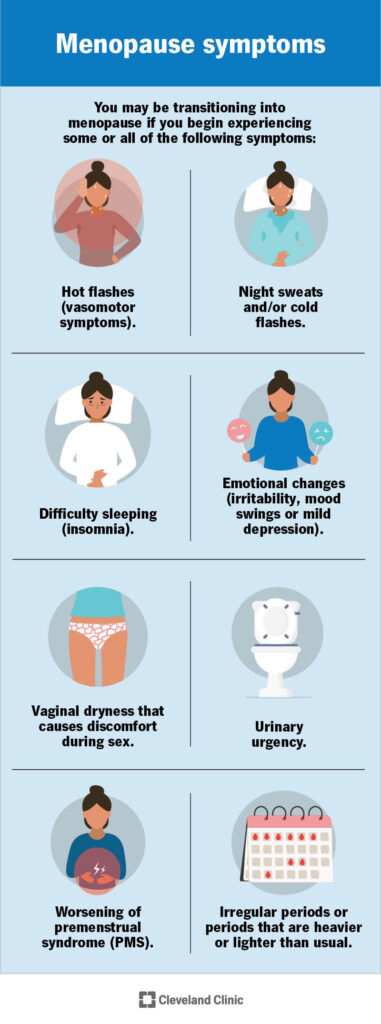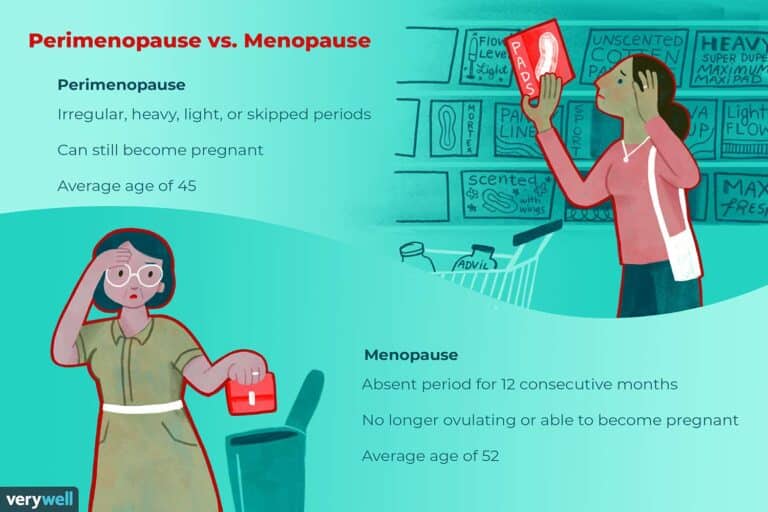Menopause is a significant milestone in a woman’s life, marking the end of her reproductive years. While it is a natural biological process, menopause often comes with a mix of physical, emotional, and hormonal changes that vary from person to person. For some, it may be a smooth transition, but for others, it can bring challenges that require careful management. In this detailed guide, we’ll explore what menopause is, its stages, the average age it starts, the symptoms to expect, and how to manage them effectively.
What Is Menopause?
Menopause is defined as the point in time when a woman has gone 12 consecutive months without a menstrual period, indicating the cessation of ovarian function. It signals the end of ovulation and menstruation and marks the conclusion of a woman’s natural reproductive years.
While menopause is often associated with aging, it’s important to understand that it is a normal, healthy phase of life not a disease or disorder. It is also a unique experience for each woman, shaped by genetics, lifestyle, and health history.
The Average Age for Menopause
- Global Average: In the United States, the average age of menopause is around 51–52 years.
- Normal Range: Menopause typically occurs between ages 45 and 55.
- Premature Menopause: If menopause happens before age 40, it is considered premature and may result from medical conditions or treatments.
- Early Menopause: Menopause occurring between 40 and 45 years is categorized as early menopause, affecting 5–10% of women.
- Late Menopause: Menopause occurring after age 55 is less common but not unusual.
Factors Influencing Menopause Timing:
- Genetics: A strong predictor; your family history can indicate when you might experience menopause.
- Lifestyle Choices: Smoking is associated with earlier menopause, while a healthy diet and regular exercise may delay its onset.
- Medical Interventions: Cancer treatments like chemotherapy or surgeries such as oophorectomy (removal of ovaries) can cause early or sudden menopause.
- Health Conditions: Autoimmune disorders, infections, and chromosomal abnormalities may play a role.
The Three Stages of Menopause
Menopause is not a single event but a process that unfolds over several years. It is divided into three distinct stages:
1. Perimenopause (Pre-Menopause): The Transition Phase
- When It Starts: Usually begins in a woman’s 40s but can start in the mid-30s for some.
- Duration: Can last 4 to 8 years.
- What Happens: Hormone levels, particularly estrogen and progesterone, start to fluctuate. This leads to symptoms like irregular periods, mood swings, and hot flashes. Ovulation becomes less predictable, and fertility declines.
2. Menopause: The Main Event
- When It Occurs: The average age is around 51 years.
- Duration: This phase is marked by 12 consecutive months without menstruation. Once this milestone is reached, a woman is considered menopausal.
- What Happens: Hormone production by the ovaries drops significantly, and symptoms such as hot flashes, night sweats, and vaginal dryness may peak.
3. Post-Menopause: Life After Menopause
- When It Starts: Begins immediately after the 12-month milestone of menopause.
- What Happens: Symptoms often subside or become milder, but lower estrogen levels increase the risk of osteoporosis, heart disease, and other health concerns. Women remain in this phase for the rest of their lives.
Menopause Symptoms: What to Expect

The symptoms of menopause can vary widely in intensity and duration. While some women may experience mild or no symptoms, others may find their daily lives disrupted. Here’s a detailed look at the symptoms by stage and age:
| Symptom | Perimenopause (40s) | Menopause (50s) | Post-Menopause (55+) |
|---|---|---|---|
| Irregular Periods | Common; periods may become lighter, heavier, or more spaced out. | Absent for 12 months. | No periods. |
| Hot Flashes | Mild to moderate; increasing in frequency. | Most intense around menopause. | May continue for several years. |
| Mood Changes | Irritability, sadness, and anxiety are common. | Mood swings may intensify. | Often stabilize. |
| Vaginal Dryness | Mild dryness may begin. | Often worsens, impacting sex. | Requires ongoing care. |
| Sleep Problems | Difficulty falling or staying asleep. | Night sweats disrupt sleep. | Persistent insomnia in some. |
| Weight Gain | Gradual due to a slowing metabolism. | More pronounced; body composition changes. | Stabilizes with lifestyle changes. |
Managing Menopause Symptoms
1. Lifestyle Adjustments
Making healthy lifestyle choices can alleviate many menopause symptoms:
- Diet: Include calcium-rich foods, vitamin D, and phytoestrogens (e.g., soy, flaxseed) in your diet. Avoid spicy foods, alcohol, and caffeine to reduce hot flashes.
- Exercise: Engage in regular physical activity to boost mood, manage weight, and strengthen bones.
- Sleep Hygiene: Maintain a consistent sleep schedule, create a cool sleeping environment, and avoid screens before bed.
2. Medical Treatments
If symptoms are severe, your healthcare provider may recommend:
- Hormone Therapy (HT): Estrogen or combination estrogen-progestogen therapy can relieve hot flashes, vaginal dryness, and prevent bone loss.
- Non-Hormonal Options: Antidepressants, gabapentin, or oxybutynin may help manage hot flashes and mood swings.
- Vaginal Treatments: Moisturizers, lubricants, and vaginal estrogen creams can reduce dryness and discomfort.
3. Alternative Therapies
Some women find relief through complementary approaches, such as:
- Acupuncture: May help reduce hot flashes and improve sleep.
- Herbal Remedies: Black cohosh, red clover, and evening primrose oil are popular, though evidence of their effectiveness is limited.
- Mindfulness and Yoga: Proven to reduce stress and improve mood.
When to See a Doctor
It’s important to consult a healthcare provider if you experience:
- Abnormal Bleeding: Heavy or irregular periods, or bleeding after menopause, may indicate underlying issues.
- Severe Symptoms: Hot flashes, insomnia, or mood changes that disrupt daily life should be addressed.
- Post-Menopausal Bleeding: This could be a sign of serious conditions like endometrial cancer.
Health Risks Associated with Menopause
The decline in estrogen levels during and after menopause increases the risk of certain health conditions:
- Osteoporosis: Weakening of bones leads to a higher risk of fractures. Calcium, vitamin D, and weight-bearing exercises are crucial for prevention.
- Heart Disease: Estrogen has a protective effect on the heart, and its decline can increase cardiovascular risk. Maintain a healthy diet, exercise, and monitor cholesterol levels.
- Urinary Incontinence: Pelvic floor exercises and lifestyle changes can help manage this condition.
FAQs
| Question | Answer |
|---|---|
| Can I still get pregnant during perimenopause? | Yes, ovulation may still occur sporadically. Use contraception if pregnancy isn’t desired. |
| Do all women experience hot flashes? | No, symptoms vary widely. Some women never experience hot flashes. |
| How long do menopause symptoms last? | Symptoms typically last 2–7 years but can persist longer in some women. |
| Is hormone therapy safe? | Hormone therapy is generally safe for most women but should be discussed with a doctor. |
Conclusion
Menopause is a natural and inevitable part of aging that marks the transition to a new phase of life. While it can bring challenges, it’s also an opportunity to focus on self-care, health, and well-being. Understanding the stages, symptoms, and available treatments can empower you to navigate menopause with confidence and grace. If symptoms feel overwhelming, remember that help is available—consulting a healthcare provider can make a significant difference in your journey.
References
American College of Obstetricians and Gynecologists (ACOG)
The Menopause Years: Changes and Management. ACOG. Published 2023.
https://www.acog.org/womens-health/faqs/menopause
National Institute on Aging
Menopause: A Natural Part of Aging. National Institute on Aging. Updated June 2023.
https://www.nia.nih.gov/health/menopause
The North American Menopause Society (NAMS)
Stages of Reproductive Aging Workshop + 10: Addressing Key Issues in Menopause Research. The North American Menopause Society. Published 2022.
https://www.menopause.org/
Mayo Clinic
Menopause: Symptoms and Causes. Mayo Clinic. Updated December 2024.
https://www.mayoclinic.org/diseases-conditions/menopause/symptoms-causes
Cleveland Clinic
Menopause: Causes, Symptoms, and Treatment. Cleveland Clinic. Updated February 2025.
https://my.clevelandclinic.org/health/diseases/21823-menopause


